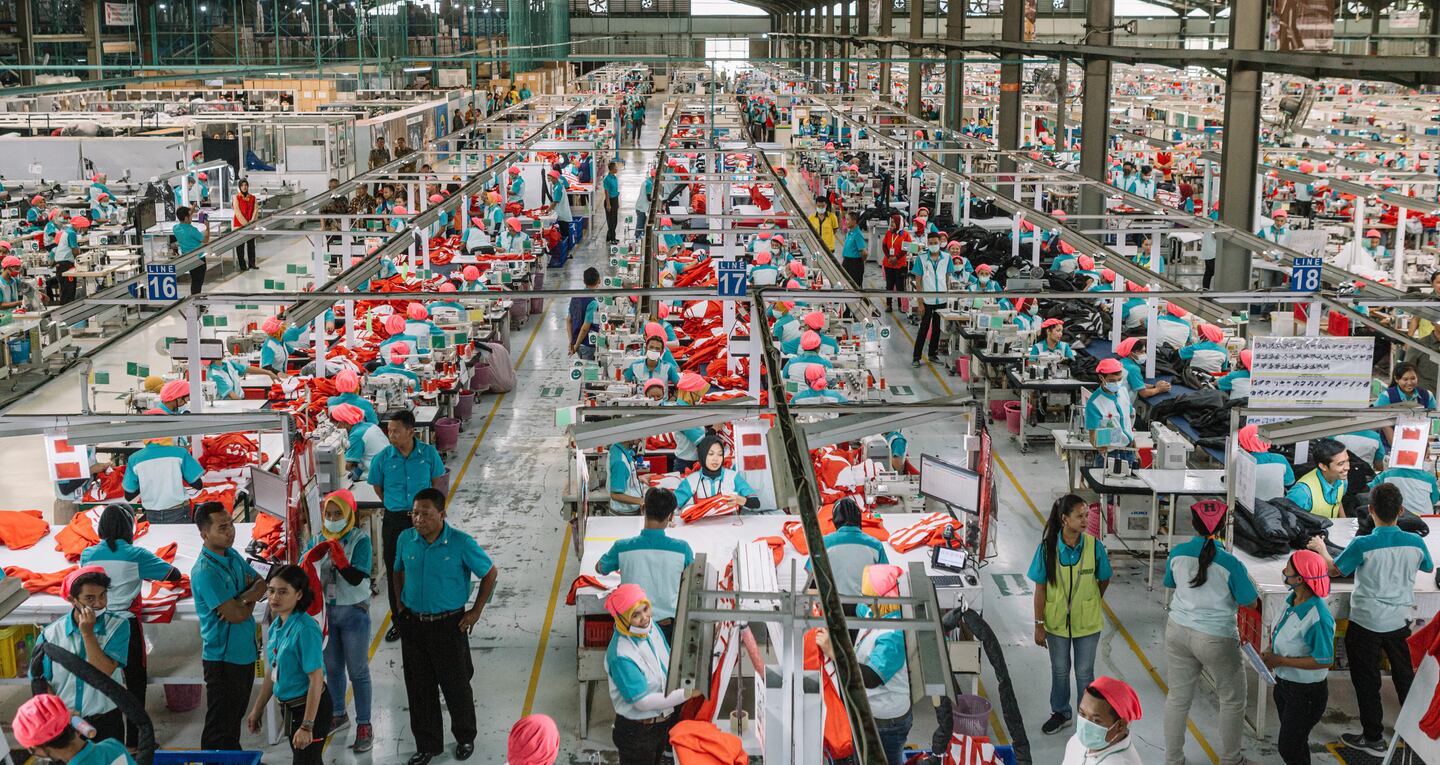
The Business of Fashion
Agenda-setting intelligence, analysis and advice for the global fashion community.

Agenda-setting intelligence, analysis and advice for the global fashion community.

An Indonesian clothing firm that’s plunged into distress in the credit markets is fueling broader concerns about the nation’s apparel sector, which has been particularly vulnerable to faltering global demand during the pandemic.
PT Pan Brothers makes clothes for Ralph Lauren, Prada and Adidas. But in debt markets, it’s lost its panache. The manufacturer’s dollar bonds slid this week to record lows at about 37 cents on the dollar after it postponed a new global debt offering and had to get a temporary extension from creditors on a loan in the U.S. currency.
The company and its subsidiaries need to repay or refinance $310 million of offshore debt this year and next, consisting of the loan and a $171 million bond that will mature in January 2022, according to data compiled by Bloomberg.
Its exports, which make up more than 80 percent of sales, stagnated in the first nine months of last year as the pandemic shuttered retail stores. The firm’s net profit rose 0.4 percent in that period to $19.2 million, the slowest pace in three years, according to its latest financial report.
ADVERTISEMENT
Pan Brothers said in a Dec. 3 investor meeting that some customers had delayed payments and its financial statement shows net trade receivables increased 11 percent annually to $127.5 million in the January to September period.
As the second-biggest listed clothing firm in Indonesia, Pan Brothers is signalling wider stresses in the industry. Apparel is one of Indonesia’s top 10 non-oil and gas exports, and the sector was among the hardest hit last year as the pandemic curtailed demand. Overseas shipments fell 18.7 percent annually, according to the nation’s statistics bureau.
Troubles for the sector may have a wider impact on the economy. A reduction in operations by apparel firms during the virus outbreak has added to the number of people laid off in the world’s fourth most populous nation. Clothing makers for years employed the second-highest number of people in the manufacturing sector, which is the main contributor to Indonesia’s gross domestic product. In 2020, they slumped to 13th place, government data show.
Rival PT Sri Rejeki Isman, the country’s biggest listed apparel firm, has also asked lenders for an extension on the maturity of a dollar loan.
Pan Brothers is continuing talks with banks for a new syndicated loan. The company had previously said it would use funds from the new global bond to settle its debt, but it may face a hard time attracting investors with the existing note trading in distressed territory.
Pan Brothers expects to be able to proceed with the global bond sale in the second quarter to solve its refinancing issues. It’s ready to provide a corporate guarantee for the new notes and also use its own and the units’ assets as collateral, according to the offering prospectus.
Founded in 1980, the company which is based near Jakarta, produces clothes mainly for export. It said at the December meeting that it had 25 factories across three provinces in Indonesia that make 117 million clothing articles annually.
It ventured into making masks and other personal protective equipment in March after the pandemic disrupted business. While it initially produced PPE for domestic distribution, it received requests from overseas as well and such sales ended up accounting for $58 million, or 12.6 percent, of its total exports throughout January-September.
ADVERTISEMENT
Fitch Ratings this month cut Pan Brothers’ long-term issuer default rating and its existing unsecured dollar note to C from CC. It also downgraded the company’s national long-term rating to the same level, which denotes that a default or default-like process has begun, or the issuer is in standstill.
The clothing firm’s lengthy negotiations with lenders and short standstill period reflect its weak liquidity position and constrained access to alternative funding sources. The only resolution of the company’s capital structure is through restructuring, at which point Fitch could downgrade the issuer default rating to a restricted default level, according to a Feb. 1 note from Fitch.
Moody’s Investors Service cut Pan Brothers’ ratings last month to Ca from Caa1. The outlook remains negative, which reflects the additional uncertainty around the recovery rate for its dollar bond in the event of a default, analyst Stephanie Cheong said in a Jan. 15 report.
The focus now is on whether Pan Brothers will be able to achieve a definite agreement with lenders on the syndicated loan. Investors are also watching if the company will be able to raise the funds it’s targeting with the planned bond offering, with an annual coupon that it says will be a maximum of 12 percent.
Two Indonesian companies with stronger ratings — Sri Rejeki and PT Tower Bersama Infrastructure — decided to pull their global bond sales due to what they called unfavourable market conditions.
By Tassia Sipahutar.
From analysis of the global fashion and beauty industries to career and personal advice, BoF’s founder and CEO, Imran Amed, will be answering your questions on Sunday, February 18, 2024 during London Fashion Week.
The State of Fashion 2024 breaks down the 10 themes that will define the industry in the year ahead.
Imran Amed reviews the most important fashion stories of the year and shares his predictions on what this means for the industry in 2024.
After three days of inspiring talks, guests closed out BoF’s gathering for big thinkers with a black tie gala followed by an intimate performance from Rita Ora — guest starring Billy Porter.